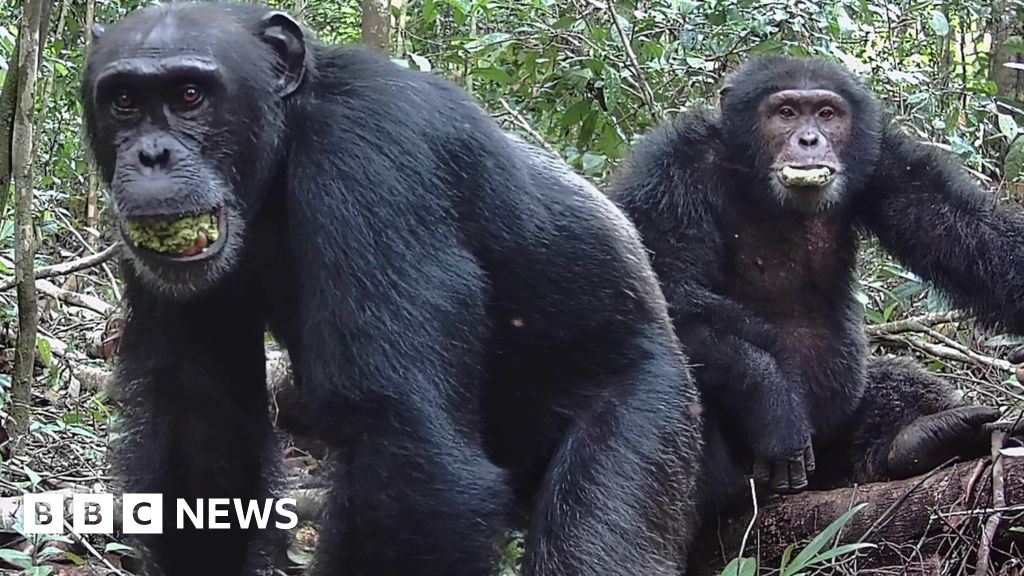Science
Wild Chimps Consume Daily Alcohol from Fermented Fruits

Wild chimpanzees are consuming the equivalent of a bottle of lager’s alcohol daily by eating ripened fruit, according to a recent study. This discovery suggests that the human affinity for alcohol may have roots in our common ancestry with primates, who historically relied on fermented fruit as a food source rich in sugar and alcohol.
Researchers from the University of California, Berkeley, found that chimpanzees in Côte d’Ivoire and Uganda ingest approximately 14 grams of ethanol daily, equivalent to nearly two UK units or about one 330ml bottle of lager. By analyzing the alcohol content of fruits such as figs and plums, the team was able to quantify the alcohol intake of these wild animals. The fruits most commonly consumed were those highest in alcohol content, underscoring the dietary preferences of these primates.
Insights into Human-Animal Connection
The research adds support to the “drunken monkey” hypothesis, which posits that the craving for alcohol in humans may have been inherited from our primate ancestors. This theory was first proposed by Professor Robert Dudley, also from the University of California, Berkeley, who is a co-researcher on the study.
Initially met with skepticism, the idea has gained traction as more observations of primate behavior have emerged. Professor Catherine Hobaiter, a primatologist at the University of St Andrews who was not involved in the study, noted, “What we’re realizing from this work is that our relationship with alcohol goes deep back into evolutionary time, probably about 30 million years.”
These findings point to the possibility that the consumption of fermented fruit may serve social functions among chimpanzees, facilitating bonding as they gather on the forest floor to enjoy the fruits.
Alcohol Consumption and Its Implications
Despite the significant amounts of alcohol they consume, the chimpanzees in this study are not drinking enough to become intoxicated. Dr. Kimberley Hockings, a primate researcher at the University of Exeter who did not participate in the study, emphasized that had they been consuming alcohol at levels leading to drunkenness, it would likely compromise their survival chances.
The study highlights not only the dietary habits of chimpanzees but also raises awareness about their conservation status. According to the International Union for the Conservation of Nature, chimpanzees are classified as endangered, facing significant threats from habitat loss due to farming, logging, and urban development.
The findings of this research are published in the journal Science Advances, shedding light on the evolutionary connections between humans and chimpanzees while also prompting discussions about the conservation of these intelligent creatures.
-

 Health2 months ago
Health2 months agoNeurologist Warns Excessive Use of Supplements Can Harm Brain
-

 Health2 months ago
Health2 months agoFiona Phillips’ Husband Shares Heartfelt Update on Her Alzheimer’s Journey
-

 Science2 weeks ago
Science2 weeks agoBrian Cox Addresses Claims of Alien Probe in 3I/ATLAS Discovery
-

 Science2 weeks ago
Science2 weeks agoNASA Investigates Unusual Comet 3I/ATLAS; New Findings Emerge
-

 Science2 weeks ago
Science2 weeks agoScientists Examine 3I/ATLAS: Alien Artifact or Cosmic Oddity?
-

 Entertainment4 months ago
Entertainment4 months agoKerry Katona Discusses Future Baby Plans and Brian McFadden’s Wedding
-

 Science1 week ago
Science1 week agoNASA Investigates Speedy Object 3I/ATLAS, Sparking Speculation
-

 World2 months ago
World2 months agoCole Palmer’s Cryptic Message to Kobbie Mainoo Following Loan Talks
-

 Entertainment3 months ago
Entertainment3 months agoEmmerdale Faces Tension as Dylan and April’s Lives Hang in the Balance
-

 Science1 week ago
Science1 week agoNASA Scientists Explore Origins of 3I/ATLAS, a Fast-Moving Visitor
-

 Entertainment4 months ago
Entertainment4 months agoLove Island Star Toni Laite’s Mother Expresses Disappointment Over Coupling Decision
-

 Entertainment2 months ago
Entertainment2 months agoMajor Cast Changes at Coronation Street: Exits and Returns in 2025









